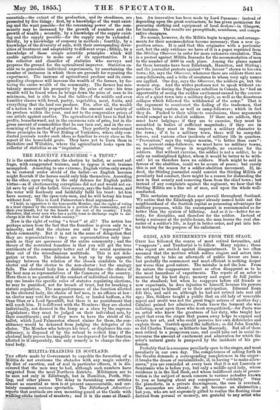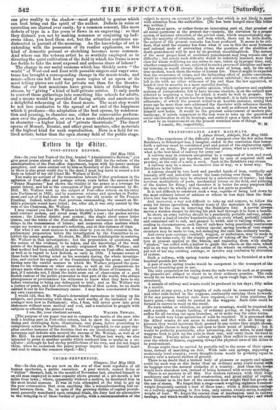GRIST, AND RETIREMENTS FROM THE STAGE.
Outer has followed the course of most retired favourites, and " reappears" ; and Tamburini is to follow. Many rejoice ; those who regret are steeled against disappointment. It is too often assumed that the motives which seduce singers and actors into the attempt to take an aftermath of public favour are base ; but probably the commonest and most efficient is nothing deeper nor worse than good-nature. The mistake is not the less. From its nature the reappearance must so often disappoint as to be the most hazardous of experiments. The repute of an actor is measured by his best days ; memory and report do full justice to the standard; but when he reappears before old friends or new expectants, he does injustice to himself, because his powers are not equal to himself or to their anticipation. Edmund Kean felt this, and said so, although he had not retired into real old age; Mrs. Siddons taught a public that an old lady of venerable aspect and credit was not the great tragic actress of another day ; Catalani pained her admirers; Pasta knew the torment she was inflicting, most upon those who most sympathized,—for Pasta was an artist who knew the greatness of her duty, who taught her pupil that even the singer that passes away helps to expand and elevate her art, and who could perceive her own deficiencies and explain them. Garrick spared the infliction; so did John Kemble; so did Charles Young; so hitherto has Maoready. But all of these men retired to a prosperous ease, and could take out in social in- tercourse the amount of excitement and admiration for which the actor's natural gusto is pampered by the incidents of his pro- fession.
Probably that is a resource peculiarly open to the singer, and most peculiarly in our own day. 31e completeness of setting forth in the theatre demands a corresponding completeness in the singer : it breaks the dream of verisimilitude, if in having " to make allow- ances," you are reminded at every turn that it is not Luorezia or Semiramis who is before you, but only a middle-aged lady, whose residence is in the Red Book, and whose indifferent state of preser- vation is the subject of much concern to various nobodies known to you as hanging about any conspicuous " celebrity." Over the pianoforte, in a private drawingroom, the case is reversed. The accessories are absent ; the art becomes an abstraction; but you, who are not supremely gifted to realize the floating ideas derived from perusal or memory, are grateful to any artist Who
can give reality to the shadow—most grateful to genius which can best bring out the spirit of the author. Defects in voice or execution are slurred over easily, by a common consent, like mere defects of type in a fine poem or flaws in an engraving : so that they distract you not by making nonsense or conjuring up ludi- crous ideas, you heed them not, but the attention continues nn- distracted in pursuit of the meaning. As the knowledge of art is extending with the possession of its readier appliances, so this kind of domestic perusal or sketching becomes more common. And where can the veteran artist be so worthily employed as in directing the quiet cultivation of the field in which his frame is now too feeble to take the most exposed and arduous share of labour ? The change in our social customs which has thickly sown " the world " of West end and East with passable singers and eager ama- teurs has brought a corresponding change in the music-trade, and music-sellers can tell how many more copies of an opera or its most telling pieces are sold for private use than for the theatre. Some of our best musicians have given hints of following the stream, by "giving " a kind of half-private soirees. It only needs to convert these gatherings into something like schools for adults, and a means would be provided of fusing. artists and amateurs in a delightful rehearsing of the finest music. The next step would be not less conducive to the spread of art and of the happiness which it produces—the adaptation of the best operas, by condensa- tion and pruning, to chamber use, either for consecutive perform- ance over the pianoforte, or even for a more elaborate performance in character—a higher kind of " private theatricals." The finest operas of Mozart, Rossini, and other great masters, offer materials of the highest kind for such reproduction. Here is a field for re- tired artists, better than the open stormy field of the public stage.



































 Previous page
Previous page